Martin Takáč
Tractable Probabilistic Models for Investment Planning
Nov 17, 2025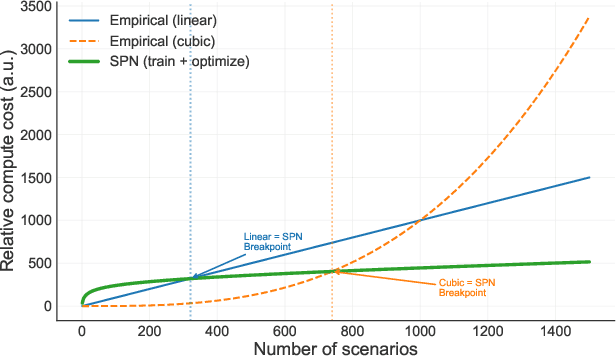
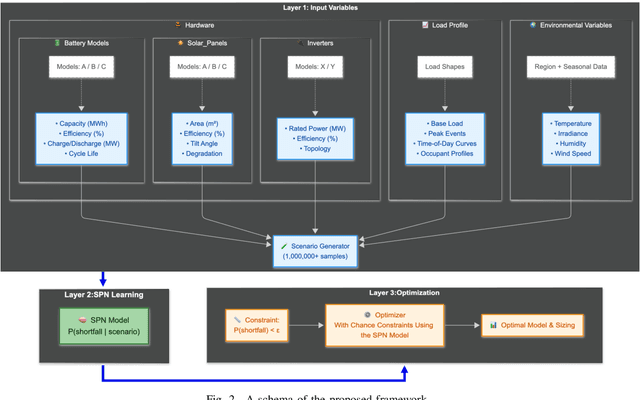
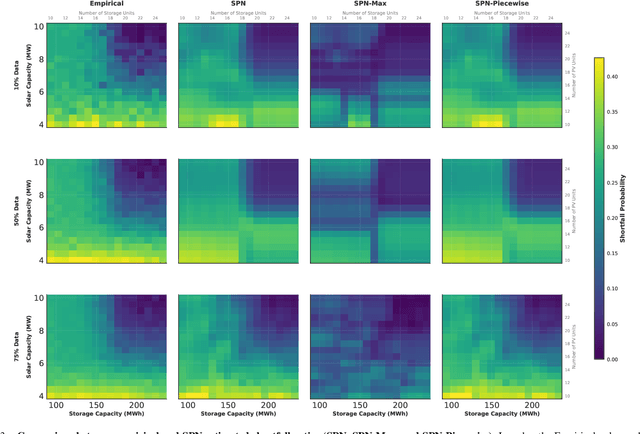

Abstract:Investment planning in power utilities, such as generation and transmission expansion, requires decade-long forecasts under profound uncertainty. Forecasting of energy mix and energy use decades ahead is nontrivial. Classical approaches focus on generating a finite number of scenarios (modeled as a mixture of Diracs in statistical theory terms), which limits insight into scenario-specific volatility and hinders robust decision-making. We propose an alternative using tractable probabilistic models (TPMs), particularly sum-product networks (SPNs). These models enable exact, scalable inference of key quantities such as scenario likelihoods, marginals, and conditional probabilities, supporting robust scenario expansion and risk assessment. This framework enables direct embedding of chance-constrained optimization into investment planning, enforcing safety or reliability with prescribed confidence levels. TPMs allow both scenario analysis and volatility quantification by compactly representing high-dimensional uncertainties. We demonstrate the approach's effectiveness through a representative power system planning case study, illustrating computational and reliability advantages over traditional scenario-based models.
Who to Trust? Aggregating Client Knowledge in Logit-Based Federated Learning
Sep 18, 2025Abstract:Federated learning (FL) usually shares model weights or gradients, which is costly for large models. Logit-based FL reduces this cost by sharing only logits computed on a public proxy dataset. However, aggregating information from heterogeneous clients is still challenging. This paper studies this problem, introduces and compares three logit aggregation methods: simple averaging, uncertainty-weighted averaging, and a learned meta-aggregator. Evaluated on MNIST and CIFAR-10, these methods reduce communication overhead, improve robustness under non-IID data, and achieve accuracy competitive with centralized training.
Simple Stepsize for Quasi-Newton Methods with Global Convergence Guarantees
Aug 27, 2025Abstract:Quasi-Newton methods are widely used for solving convex optimization problems due to their ease of implementation, practical efficiency, and strong local convergence guarantees. However, their global convergence is typically established only under specific line search strategies and the assumption of strong convexity. In this work, we extend the theoretical understanding of Quasi-Newton methods by introducing a simple stepsize schedule that guarantees a global convergence rate of ${O}(1/k)$ for the convex functions. Furthermore, we show that when the inexactness of the Hessian approximation is controlled within a prescribed relative accuracy, the method attains an accelerated convergence rate of ${O}(1/k^2)$ -- matching the best-known rates of both Nesterov's accelerated gradient method and cubically regularized Newton methods. We validate our theoretical findings through empirical comparisons, demonstrating clear improvements over standard Quasi-Newton baselines. To further enhance robustness, we develop an adaptive variant that adjusts to the function's curvature while retaining the global convergence guarantees of the non-adaptive algorithm.
The AI Data Scientist
Aug 25, 2025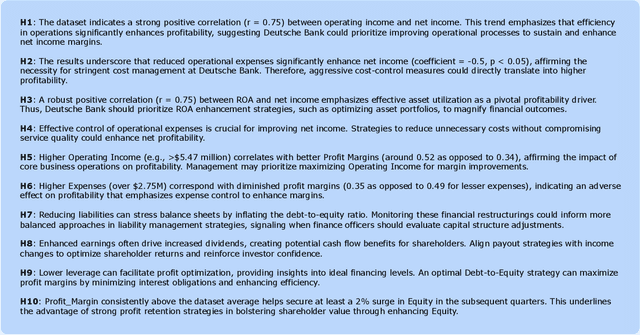
Abstract:Imagine decision-makers uploading data and, within minutes, receiving clear, actionable insights delivered straight to their fingertips. That is the promise of the AI Data Scientist, an autonomous Agent powered by large language models (LLMs) that closes the gap between evidence and action. Rather than simply writing code or responding to prompts, it reasons through questions, tests ideas, and delivers end-to-end insights at a pace far beyond traditional workflows. Guided by the scientific tenet of the hypothesis, this Agent uncovers explanatory patterns in data, evaluates their statistical significance, and uses them to inform predictive modeling. It then translates these results into recommendations that are both rigorous and accessible. At the core of the AI Data Scientist is a team of specialized LLM Subagents, each responsible for a distinct task such as data cleaning, statistical testing, validation, and plain-language communication. These Subagents write their own code, reason about causality, and identify when additional data is needed to support sound conclusions. Together, they achieve in minutes what might otherwise take days or weeks, enabling a new kind of interaction that makes deep data science both accessible and actionable.
LLM-BABYBENCH: Understanding and Evaluating Grounded Planning and Reasoning in LLMs
May 17, 2025Abstract:Assessing the capacity of Large Language Models (LLMs) to plan and reason within the constraints of interactive environments is crucial for developing capable AI agents. We introduce $\textbf{LLM-BabyBench}$, a new benchmark suite designed specifically for this purpose. Built upon a textual adaptation of the procedurally generated BabyAI grid world, this suite evaluates LLMs on three fundamental aspects of grounded intelligence: (1) predicting the consequences of actions on the environment state ($\textbf{Predict}$ task), (2) generating sequences of low-level actions to achieve specified objectives ($\textbf{Plan}$ task), and (3) decomposing high-level instructions into coherent subgoal sequences ($\textbf{Decompose}$ task). We detail the methodology for generating the three corresponding datasets ($\texttt{LLM-BabyBench-Predict}$, $\texttt{-Plan}$, $\texttt{-Decompose}$) by extracting structured information from an expert agent operating within the text-based environment. Furthermore, we provide a standardized evaluation harness and metrics, including environment interaction for validating generated plans, to facilitate reproducible assessment of diverse LLMs. Initial baseline results highlight the challenges posed by these grounded reasoning tasks. The benchmark suite, datasets, data generation code, and evaluation code are made publicly available ($\href{https://github.com/choukrani/llm-babybench}{\text{GitHub}}$, $\href{https://huggingface.co/datasets/salem-mbzuai/LLM-BabyBench}{\text{HuggingFace}}$).
Trial and Trust: Addressing Byzantine Attacks with Comprehensive Defense Strategy
May 12, 2025Abstract:Recent advancements in machine learning have improved performance while also increasing computational demands. While federated and distributed setups address these issues, their structure is vulnerable to malicious influences. In this paper, we address a specific threat, Byzantine attacks, where compromised clients inject adversarial updates to derail global convergence. We combine the trust scores concept with trial function methodology to dynamically filter outliers. Our methods address the critical limitations of previous approaches, allowing functionality even when Byzantine nodes are in the majority. Moreover, our algorithms adapt to widely used scaled methods like Adam and RMSProp, as well as practical scenarios, including local training and partial participation. We validate the robustness of our methods by conducting extensive experiments on both synthetic and real ECG data collected from medical institutions. Furthermore, we provide a broad theoretical analysis of our algorithms and their extensions to aforementioned practical setups. The convergence guarantees of our methods are comparable to those of classical algorithms developed without Byzantine interference.
Fishing For Cheap And Efficient Pruners At Initialization
Feb 17, 2025Abstract:Pruning offers a promising solution to mitigate the associated costs and environmental impact of deploying large deep neural networks (DNNs). Traditional approaches rely on computationally expensive trained models or time-consuming iterative prune-retrain cycles, undermining their utility in resource-constrained settings. To address this issue, we build upon the established principles of saliency (LeCun et al., 1989) and connection sensitivity (Lee et al., 2018) to tackle the challenging problem of one-shot pruning neural networks (NNs) before training (PBT) at initialization. We introduce Fisher-Taylor Sensitivity (FTS), a computationally cheap and efficient pruning criterion based on the empirical Fisher Information Matrix (FIM) diagonal, offering a viable alternative for integrating first- and second-order information to identify a model's structurally important parameters. Although the FIM-Hessian equivalency only holds for convergent models that maximize the likelihood, recent studies (Karakida et al., 2019) suggest that, even at initialization, the FIM captures essential geometric information of parameters in overparameterized NNs, providing the basis for our method. Finally, we demonstrate empirically that layer collapse, a critical limitation of data-dependent pruning methodologies, is easily overcome by pruning within a single training epoch after initialization. We perform experiments on ResNet18 and VGG19 with CIFAR-10 and CIFAR-100, widely used benchmarks in pruning research. Our method achieves competitive performance against state-of-the-art techniques for one-shot PBT, even under extreme sparsity conditions. Our code is made available to the public.
Knowledge Distillation from Large Language Models for Household Energy Modeling
Feb 05, 2025Abstract:Machine learning (ML) is increasingly vital for smart-grid research, yet restricted access to realistic, diverse data - often due to privacy concerns - slows progress and fuels doubts within the energy sector about adopting ML-based strategies. We propose integrating Large Language Models (LLMs) in energy modeling to generate realistic, culturally sensitive, and behavior-specific data for household energy usage across diverse geographies. In this study, we employ and compare five different LLMs to systematically produce family structures, weather patterns, and daily consumption profiles for households in six distinct countries. A four-stage methodology synthesizes contextual daily data, including culturally nuanced activities, realistic weather ranges, HVAC operations, and distinct `energy signatures' that capture unique consumption footprints. Additionally, we explore an alternative strategy where external weather datasets can be directly integrated, bypassing intermediate weather modeling stages while ensuring physically consistent data inputs. The resulting dataset provides insights into how cultural, climatic, and behavioral factors converge to shape carbon emissions, offering a cost-effective avenue for scenario-based energy optimization. This approach underscores how prompt engineering, combined with knowledge distillation, can advance sustainable energy research and climate mitigation efforts. Source code is available at https://github.com/Singularity-AI-Lab/LLM-Energy-Knowledge-Distillation .
Revisiting LocalSGD and SCAFFOLD: Improved Rates and Missing Analysis
Jan 08, 2025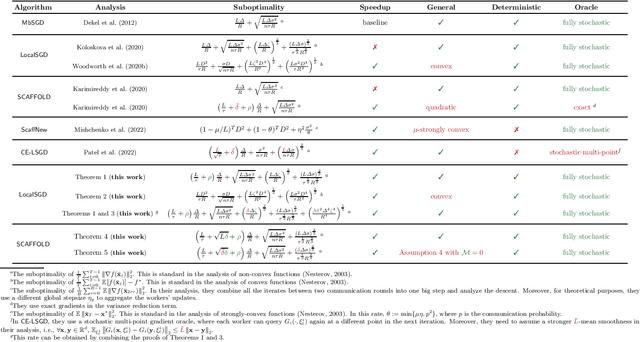



Abstract:LocalSGD and SCAFFOLD are widely used methods in distributed stochastic optimization, with numerous applications in machine learning, large-scale data processing, and federated learning. However, rigorously establishing their theoretical advantages over simpler methods, such as minibatch SGD (MbSGD), has proven challenging, as existing analyses often rely on strong assumptions, unrealistic premises, or overly restrictive scenarios. In this work, we revisit the convergence properties of LocalSGD and SCAFFOLD under a variety of existing or weaker conditions, including gradient similarity, Hessian similarity, weak convexity, and Lipschitz continuity of the Hessian. Our analysis shows that (i) LocalSGD achieves faster convergence compared to MbSGD for weakly convex functions without requiring stronger gradient similarity assumptions; (ii) LocalSGD benefits significantly from higher-order similarity and smoothness; and (iii) SCAFFOLD demonstrates faster convergence than MbSGD for a broader class of non-quadratic functions. These theoretical insights provide a clearer understanding of the conditions under which LocalSGD and SCAFFOLD outperform MbSGD.
Generalizing in Net-Zero Microgrids: A Study with Federated PPO and TRPO
Dec 30, 2024Abstract:This work addresses the challenge of optimal energy management in microgrids through a collaborative and privacy-preserving framework. We propose the FedTRPO methodology, which integrates Federated Learning (FL) and Trust Region Policy Optimization (TRPO) to manage distributed energy resources (DERs) efficiently. Using a customized version of the CityLearn environment and synthetically generated data, we simulate designed net-zero energy scenarios for microgrids composed of multiple buildings. Our approach emphasizes reducing energy costs and carbon emissions while ensuring privacy. Experimental results demonstrate that FedTRPO is comparable with state-of-the-art federated RL methodologies without hyperparameter tunning. The proposed framework highlights the feasibility of collaborative learning for achieving optimal control policies in energy systems, advancing the goals of sustainable and efficient smart grids.
 Add to Chrome
Add to Chrome Add to Firefox
Add to Firefox Add to Edge
Add to Edge